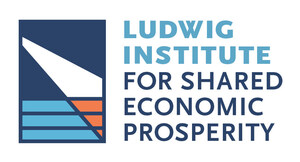LMI households hit hardest by rising housing, transportation, healthcare costs
WASHINGTON, Dec. 19, 2024 /PRNewswire/ -- Inflation disproportionately affected low- and middle-income (LMI) households in 2023, with the cost of basic necessities rising more than double the official inflation rate, according to a new study by the Ludwig Institute for Shared Economic Prosperity (LISEP).
LISEP today issued data for its 2023 True Living Cost (TLC) Index, a cost-of-living metric tracking the change in prices for essential items and services needed to maintain a basic standard of living. The TLC shows a 9.4% increase in the cost of basic needs in 2023—more than double the 4.1% reported by the Consumer Price Index for All Urban Consumers (CPI).
Unlike the CPI, the TLC focuses on the essential expenses consuming the budgets of most American households: housing, food, healthcare, childcare, transportation, basic technology, and apparel, personal care and household items. By contrast, the CPI focuses on a diverse basket of more than 80,000 items, including items such as rental cars, second homes, and hotel rooms, that are less representative of the day-to-day household costs LMI Americans routinely face.
"The stark contrast between official inflation figures and the lived experiences of most Americans highlights a fundamental disconnect, which was made abundantly clear during November's election," said LISEP Chairman Gene Ludwig. "While the CPI provides a snapshot of price stability, to interpret it as reflective of what the average American household is experiencing is beyond misleading."
Ludwig noted that 2023 marked the highest annual TLC increase since 2001. The CPI rose 72.1% over this period, compared to 97.4% for the TLC. In addition, 2023 median weekly earnings for full-time workers as reported by the U.S. Bureau of Labor Statistics rose 5.4% before adjusting for inflation. However, when adjusted using the TLC, earnings fell 3.6%, compared to an increase of 1.3% when adjusted using the CPI.
The primary drivers of the TLC increase were significant price spikes in housing, transportation, healthcare, and food, led by an 11.4% increase in housing costs—the largest annual increase on record. Transportation costs rose 14.7% despite lower gasoline prices, due to higher insurance and financing costs. Health insurance premiums increased 7.9%, and food costs rose 4.4%.
"Middle- and working-class Americans are facing a growing economic crisis, struggling to make ends meet despite recent economic growth," Ludwig said. "The rising cost of living, when combined with stagnant wages and a shortage of living-wage employment, is creating a perfect storm that threatens social and economic stability. Ignoring the LMI plight is a dangerous gamble."
About TLC
In announcing the debut of the True Living Cost (TLC) metric in March 2022, LISEP issued the white paper "Determining More Accurate Living Cost for Median- and Lower-Income American Families" (updated June 2024). TLC assesses a set of minimal adequate needs that a household requires to function: housing, medical care, transportation, food, childcare, technology, and miscellaneous (e.g. clothing, personal care, and household items) that takes into account household size (the eight household sizes range from one to two adults and zero to three children) and the relevant census region (Northeast, Midwest, South, and West). The TLC tracks the change in price for these needs over time. By contrast, the CPI focuses on a diverse basket of more than 80,000 items that are less representative of the day-to-day household costs of LMI Americans.
About LISEP
The Ludwig Institute for Shared Economic Prosperity (LISEP) was created in 2019 by Ludwig and his wife, Dr. Carol Ludwig. The mission of LISEP is to improve the economic well-being of middle- and lower-income Americans through research and education. LISEP's original economic research includes new indicators for unemployment, earnings, and cost of living. These metrics aim to provide policymakers and the public with a more transparent view of the economic situation of all Americans, particularly low- and middle-income households, compared with misleading headline statistics. On X: @LISEP_org.
About Gene Ludwig
In addition to his role as LISEP chair, Gene Ludwig is a managing partner of Canapi LLC, a financial technology venture fund. He is the founder and CEO of Ludwig Advisors, which counsels financial firms on critical matters. Ludwig is also the founder of the Promontory family of companies. He is the former vice chairman and senior control officer of Bankers Trust New York Corp. and served as the U.S. Comptroller of the Currency from 1993 to 1998. He is also author of the book The Vanishing American Dream, which investigates the economic challenges facing low- and middle-income Americans. On X: @geneludwig.
SOURCE Ludwig Institute for Shared Economic Prosperity

WANT YOUR COMPANY'S NEWS FEATURED ON PRNEWSWIRE.COM?
Newsrooms &
Influencers
Digital Media
Outlets
Journalists
Opted In





Share this article